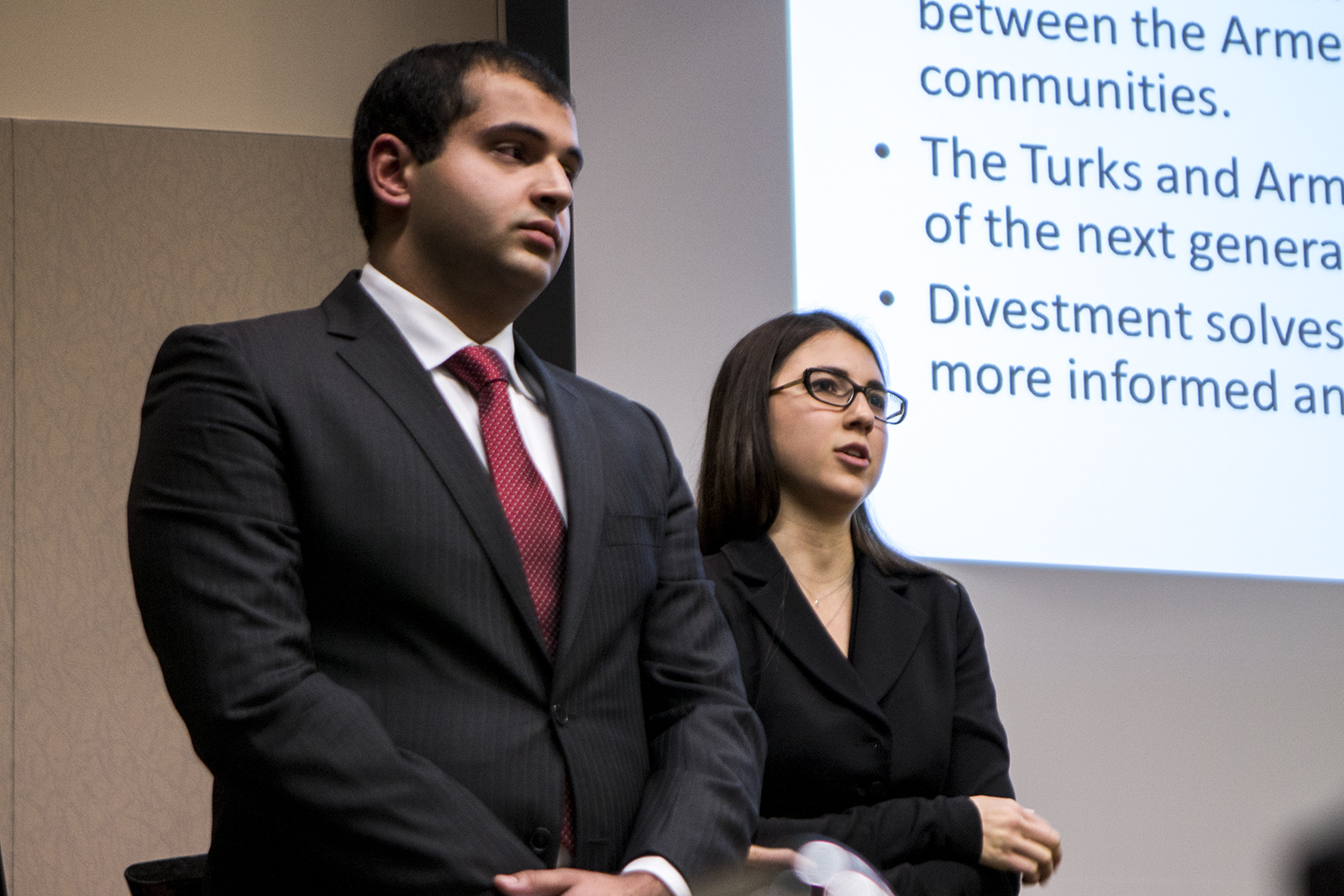Turkish Cultural Club appeals against ASA resolution to divest from Turkey

The Turkish Cultural Club appealed to the undergraduate student government Tuesday to vote against a resolution drafted by the Armenian Students’ Association calling for the University of California to divest from the Republic of Turkey. (Jennifer Hu/Daily Bruin)
By Hannah Rosson
Jan. 14, 2015 3:01 a.m.
The original version of this article contained an error and has been changed. See the bottom of the article for more information.
This article has been updated at 8:36 p.m. on Jan. 14.
The Turkish Cultural Club appealed to the undergraduate student government Tuesday to vote against a resolution drafted by the Armenian Students’ Association calling for the University of California to divest from the Republic of Turkey.
The resolution calls for the UC’s divestment from the Republic of Turkey because the Republic does not recognize and has not given reparations for the Armenian Genocide, which resulted in the deaths of 1.5 million Armenians in the early 20th century and the displacement of the Armenian community.
The Armenian Genocide has been recognized by 42 U.S. states and 22 countries, as well as by the United Nations SubCommission on Prevention of Discrimination and Protection of Minorities.
In their presentation, Gülnaz Kiper, president of the Turkish Cultural Club, and Mark Bhaskar, a member of the Olive Tree Initiative at UCLA, said they think the language of the resolution creates a divide between the Armenian and Turkish communities.
Later after the USAC meeting, members of the Olive Tree Initiative at UCLA said Bhaskar’s opinions do not represent the views of the organization and he had only attended one meeting prior to the presentation.
“(This resolution is) clearly a racist attempt to drive a wedge between the Turkish and Armenian communities here at UCLA,” said Bhaskar, a second-year political science and Middle Eastern studies student, during public comments.
Members of the Turkish Cultural Club also said they think the existence of an Armenian Genocide has been debated by scholars. Some of the students also said they would not call the killing of 1.5 million Armenians a genocide because no one debating the issue could witness events that occurred in the past.
“This is not a fact,” said Selene Sari, a member of the Turkish Cultural Club, during public comments. “In Turkey and many other nations, scholars are debating (the existence of the Armenian Genocide).”
Kiper, a third-year psychology student and an international student from Istanbul, Turkey, contradicted herself several times during and after the Undergraduate Students Association Council meeting. When asked, she said she did not think she was in a position to say whether the Armenian Genocide could be called a genocide.
“I don’t think it’s a big deal if we do or do not call it a genocide,” Kiper said in response to questions from councilmembers during her presentation. “If you want me to call it a genocide, I will.”
Kiper and Bhaskar said in their presentation that they do not think divestment is a fair decision because they said they think Turkey has a history of supporting human rights. They also said they think the Republic of Turkey, formed in 1923, did not carry out the genocide and that the Ottoman Empire was solely responsible.
“Divestment is an unfair punishment for Turkey,” Kiper said.
Kiper added that she thinks the resolution inaccurately portrays the Republic of Turkey as a country that actively silences speech on the Armenian Genocide.
Some councilmembers voiced concerns about the Turkish students not using the word “genocide” when referring to the Armenian Genocide.
Student Wellness Commissioner Savannah Badalich said she was concerned some of the comments in the presentation were microagressions against some Muslim communities. Badalich also addressed Kiper’s and Bhaksar’s claim that Turkey did not want to recognize the genocide because it was committed by the Ottoman Empire before Turkey became a nation.
Badalich said Turkey should be more willing to acknowledge the genocide if it believes the Ottoman Empire was responsible instead of the nation itself.
Last quarter, the Armenian Students’ Association announced its plan to bring the resolution to the council table, and has since held two town halls to receive feedback on and educate students about the resolution.
Natalie Kalbakian, external vice president of the Armenian Students’ Association, said the club reached out to Turkish students and tried to listen to their concerns. She also said the resolution is not meant to target Turkish students, but rather to criticize the Turkish government for not acknowledging the Armenian Genocide.
“It is upsetting to see that the University of California would be invested in such a government,” said Kalbakian, a third-year political science student.
During a town hall last Thursday, the Armenian Students’ Association invited members of the Turkish Cultural Club and Muslim Students Association to discuss and potentially alter the resolution to accommodate students’ concerns.
Mikael Matossian, a fourth-year environmental science student and president of the Armenian Students’ Association, said that some members of the Turkish Cultural Club and Muslim Students Association left the town hall early before discussing the resolution because they did not feel comfortable at the event.
USAC is set to vote on the resolution next Tuesday at its weekly meeting.
Correction: Badalich is the Student Wellness Commissioner.


